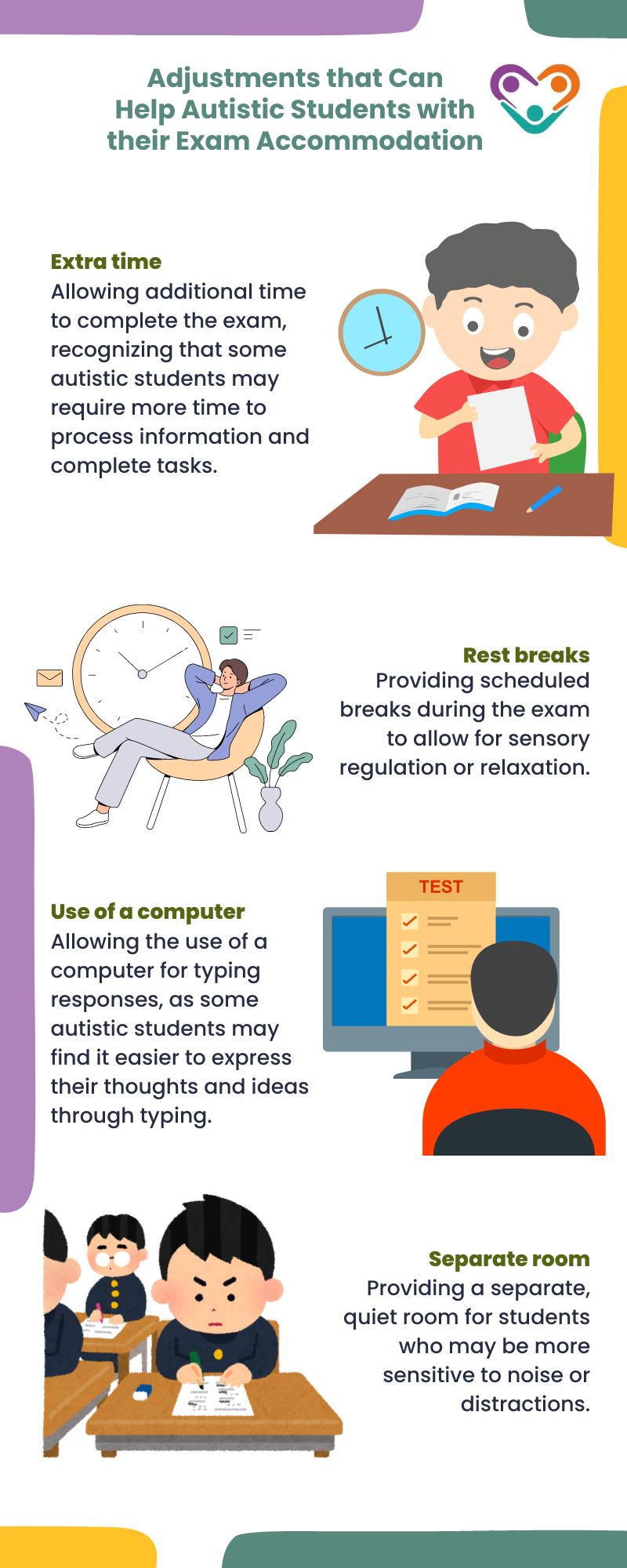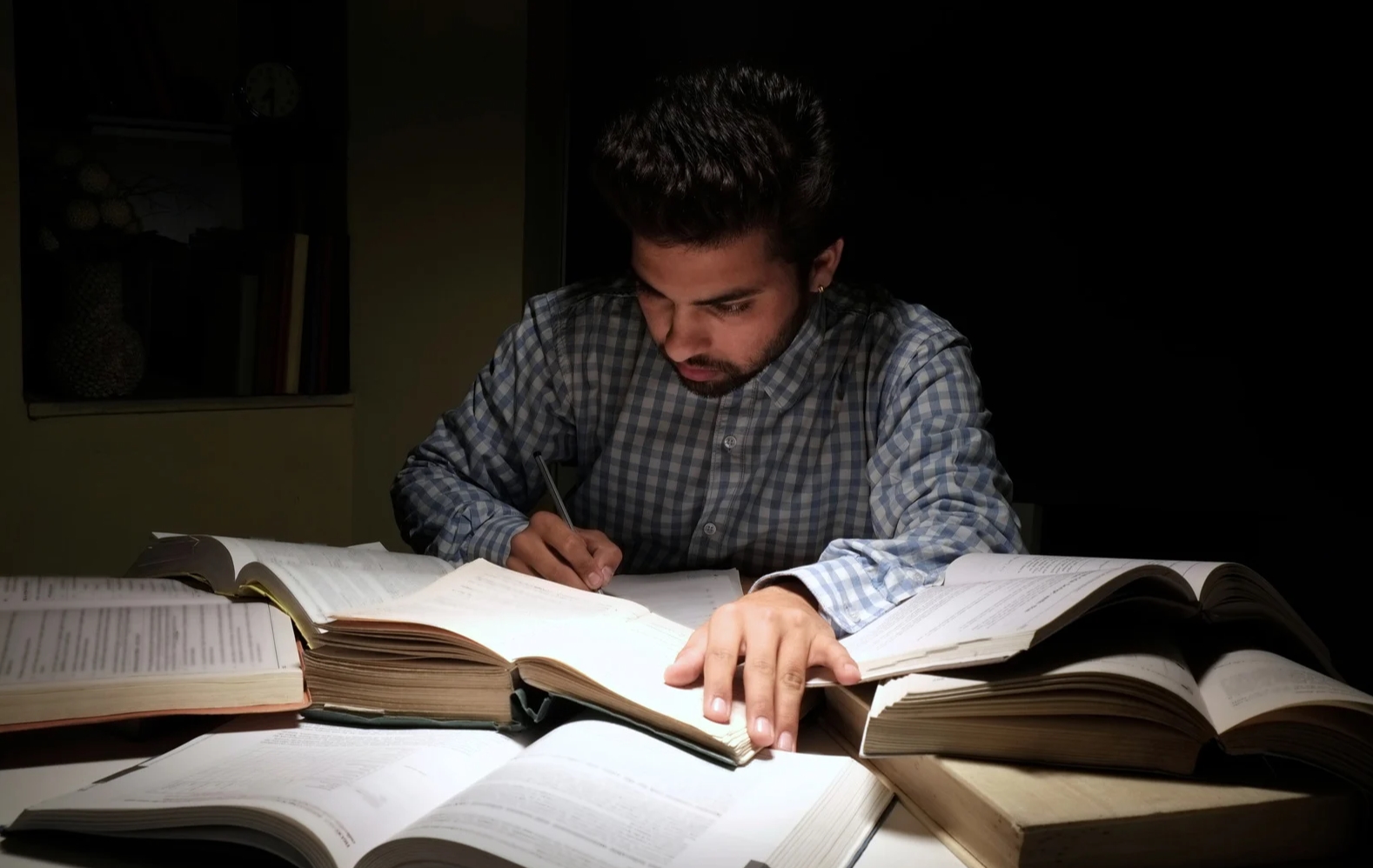For autistic students, exam preparation can present unique challenges. Understanding these challenges and the importance of effective exam preparation is crucial in supporting their success.
Autistic students may find exams stressful, particularly in terms of preparation and knowing what to expect. The absence of a structured school environment during the summer break can make it challenging for young adults with autism and learning differences to stay focused and maintain good study habits.
Reverting back to old routines and struggling to establish new ones can hinder their exam preparation efforts.
Additionally, they may experience heightened anxiety during the exam period. Practical arrangements such as knowing where to go to sit the exam can be a significant source of stress.
To help with this, we have prepared the following tips to help autistic individuals during their study sessions.

Strategies for Exam Preparation
Preparing for exams can be challenging for autistic students, but with the right strategies, it can become more manageable and less overwhelming.
Let’s explore three key strategies that autistic individuals can use during exam preparation. These are as follows:
Creating a Revision Timetable
For autistic students, structure and routine are essential for effective exam preparation. Creating a revision timetable can help them organize study sessions and ensure a systematic approach to covering all the necessary topics.
Visual timetables and social stories can be particularly useful for autistic children, as they provide a clear visual representation of the study plan and help them understand what to expect during exams.
By breaking down the revision process into smaller, manageable chunks, students can focus on specific subjects or topics each day. This approach helps prevent sensory overload and allows for more focused and effective study sessions.
Dealing with Exam Anxiety
Exam anxiety is a common challenge faced by many students, including those with autism. Autistic students may experience heightened levels of anxiety, especially when it comes to practical arrangements such as finding the exam venue or knowing where to go on the exam day.
To alleviate this anxiety, visiting the exam venues ahead of time can be immensely helpful.
By familiarizing themselves with the exam environment, autistic students can reduce anxiety and increase their comfort level. This familiarity helps them feel more at ease on the day of the exam, allowing them to focus on the content rather than being overwhelmed by their surroundings.
It also provides an opportunity to identify any potential sensory difficulties and find strategies to address them in advance.
Visiting Exam Venues
Autistic students might experience high levels of anxiety during the exam period, especially concerning practical arrangements like where to go to sit during the exam.
Visiting exam venues ahead of time can be helpful in reducing anxiety and ensuring familiarity with the environment. It allows students to become accustomed to the layout of the venue, the seating arrangements, and any potential sensory challenges they may encounter.
By experiencing the exam venue in advance, autistic students can feel more prepared and confident on the day of the exam.

Special Exam Arrangements
Special exam arrangements can also provide valuable support for autistic students to ensure a fair and optimal testing environment. These accommodations recognize the unique challenges faced by individuals with autism and aim to create an inclusive and accessible exam experience.
Applying for Accommodations
Autistic students who believe that their autism significantly affects their exam performance can apply for accommodations. These accommodations are tailored to meet the specific needs of each individual and may include adjustments such as:

To apply for accommodations, it is essential to provide evidence of the impact of autism on exam performance. This evidence can come from professionals such as educational psychologists or medical practitioners.
The evidence should clearly outline the specific adjustments required and how they will support the student’s ability to demonstrate their knowledge and abilities during the exam.
Extenuating Circumstances
In cases where an autistic student is unable to sit an exam due to physical or mental health reasons, they can apply for extenuating circumstances.
It is important for students to prioritize their well-being and not attempt to sit an exam if they are feeling unwell. Compromised performance due to illness can make it harder to apply for extenuating circumstances afterward.
Extenuating circumstances allow for the consideration of exceptional factors that may have affected the student’s ability to sit the exam. These circumstances can include illness, medical emergencies, or unforeseen personal circumstances. The specific process for applying for extenuating circumstances may vary depending on the educational institution, so it is advisable to consult with the school or exam board for guidance on the application procedure.

Tips During Exam Day
When it comes to exam day, it’s essential for parents and caregivers to provide support and create a conducive environment for individuals with autism.
Here are some tips to help ensure a smooth and successful exam experience:
Maintain a Routine
On the day of the exam, it is crucial to maintain the child’s routine as much as possible. Familiarity and predictability can help reduce stress and anxiety.
Parents and caregivers should ensure that their child follows their regular morning routine, including activities such as waking up at the usual time, having a nutritious breakfast, and getting dressed.
It is also important to make sure that the child arrives at the exam venue on time. Plan the journey in advance, considering factors such as traffic and any potential disruptions.
Arriving early can provide an opportunity for the child to familiarize themselves with the surroundings and feel more comfortable in the exam environment.
Provide Reassurance
Children with autism may experience heightened anxiety about exams. Providing reassurance can help alleviate some of their worries and boost their confidence. Let them know that it is normal to feel nervous before an exam and reassure them that they have prepared to the best of their abilities.
Encourage positive self-talk, emphasizing their strengths and reminding them of the strategies they have learned during their exam preparation. Remind them that doing their best is what matters most. Reinforce the idea that mistakes are a part of the learning process and that mistakes do not define their worth or intelligence.
During the exam, it can be helpful for parents and caregivers to wait nearby or in a designated waiting area. This provides a sense of security for the child, knowing that someone familiar is nearby.
However, it’s important to respect any rules or regulations regarding parental presence that’s set by the exam venue.
By following these tips, parents and caregivers can create a supportive environment for individuals with autism before and during exam day. These strategies can help minimize stress and anxiety, allowing the child to focus and perform to the best of their abilities.
Research continues to shed light on the neurological basis of sensory issues in autism, offering hope for more targeted and effective therapies in the future. By recognizing and addressing sensory processing difficulties, we can improve the quality of life for individuals with autism and their families. If you’re seeking specialized ABA therapy in New Jersey, Indiana, Georgia, and New York, Golden Care offers comprehensive services tailored to meet the unique needs of each individual. Contact us to learn more or book a consultation today.
Sources:
https://info.cipworldwide.org/blog/10-tips-to-help-you-stay-focused
https://www.autismparentingmagazine.com/prepare-exams-new-school-year-autism




